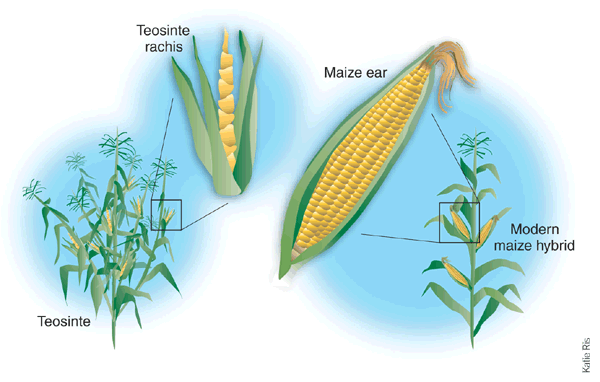On Thursday thirteen civil society organisations active in agriculture and environmental issues have officially alerted the European Commission that the wild ancestor of cultivated maize, teosinte, has appeared in Spain and is spreading widely in maize growing areas as an invasive species.

Teosinte and maize have the potential to interbreed and form hybrids. This applies equally to genetically engineered maize MON810, produced by Monsanto and grown on more than 100,000 hectares in Spain. Due to the risks of appearance of an invasive, transgenic teosinte species, the organisations have asked the Commission and the Spanish government to ban the cultivation of MON810 in 2016.
Teosinte was discovered in Spain for the first time in 2009, but has never been reported to the Commission by the Spanish authorities nor by Monsanto. However, Monsanto is legally obliged to publish annual monitoring reports about the cultivation of MON810 in the EU and potential environmental hazards, including crossbreeding. That maize is not supposed to cross and interbreed with any other species in the EU was an important precondition for allowing genetically engineered maize to be cultivated in the EU.
Meanwhile, the weedy teosinte plants continue to spread through a number of regions in Aragon, Navarra and Catalonia, and have become a serious threat to maize farmers. In some regions, the teosinte population has reached such a high density that local governments have prohibited maize cultivation to prevent it from spreading further.
“Thousands of hectares of transgenic maize producing an insecticide Bt toxin are being grown in areas affected by the spread of teosinte. If gene flow takes place from MON810 to the teosinte, it could become even more invasive”, said Blanca Ruibal, responsible for Food and Agriculture at Amigos de la Tierra. “We are highly concerned that neither the Spanish government nor Monsanto has officially informed the Commission about this major threat to agriculture and the environment. Europe could soon find itself in a situation with transgenic plants persisting and spreading not only in Spain but also in other maize growing regions in countries such as France, Italy and Portugal.”
“If there is now a wild relative of maize in Europe, it is obvious that the risk assessment of MON810 is no longer valid and that its authorisation for cultivation should be withdrawn immediately by the European Commission. This must be done before the upcoming planting season begins”, said Christoph Then from Testbiotech.
“Many organic farmers have had to abandon maize production because of the risk of contamination by MON810 maize”, said Eric Gall, policy manager at IFOAM EU. “The potential for teosinte to exacerbate the spread of transgene contamination and undermine organic production even further should be investigated by Spanish authorities and the Commission”.
In their letter, the signatories urge public authorities to immediately start investigations into the ongoing spread of teosinte in Spain, to take measures to inform farmers and to initiate measures to stop the further spread and potential introduction of teosinte to areas not yet affected.
Background
No formal alerts or information has been issued by the Spanish authorities to the EU. In response to a written question from a Member of Parliament in November 2014, the Commission stated that it had “no data on the appearance of teosinte”, and teosinte plants are not included in a list of invasive species published by the Commission in 2015.
According to the latest report from Monsanto, in 2014 MON810 maize was grown in the Czech Republic, Portugal, Romania, Slovakia and Spain, with the latter having by far the largest area, around 130,000 hectares.
Teosinte is known to grow in Mexico and was first discovered in Spain in 2009.
13 organisations have alerted the European Commission: Amigos de la Tierra, Andalucia; Libre de Trangénicos Plataforma; CECU – Confederación de Consumidores y Usuarios; COAG – Coordinadora de Organizaciones de Agricultores y Ganaderos; Ecologistas en Acción; Ecovalia; Foundation on Future Farming; IFOAM EU; Red de Semillas “Resembrando e Intercambiando”; Save our Seeds; SEAE – Sociedad Española de Agricultura Ecológica; Testbiotech; The Software AG Foundation.
Link to the letter sent to the Commission:
www.ifoam-eu.org/sites/default/files/ngos_policy_teosinte_in_spain_open_letter_20160224.pdf

















